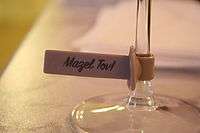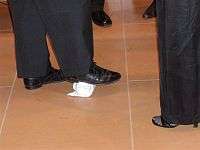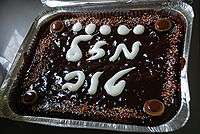Mazel tov
"Mazel tov" or "mazal tov" (Hebrew/Yiddish: מזל טוב, Hebrew: mazal tov; Yiddish: mazel tov; lit. "good fortune") is a Jewish phrase used to express congratulations for a happy and significant occasion or event.



Etymology and pronunciation
The expression comes from the Mishnaic Hebrew mazzāl, meaning "constellation" or "destiny", which may be related to nazal, meaning "to flow down".[1][2][3]
While the words mazal (or mazel in Yiddish; "luck" or "fortune") and tov ("good") are Hebrew in origin, the phrase is of Yiddish origin, and was later incorporated into Modern Hebrew.
Although the Yiddish pronunciation of mazel has the stress on the first syllable, the modern Hebrew word "mazal" has the stress on the last syllable, as is standard in modern Hebrew.
The phrase "mazel tov" is recorded as entering into American English from Yiddish in 1862.[4][5]
Similarly the Yiddish שלימזל, transliterated as shlimazl ("misfortune"), also made its way into US English (as shlemozzle, schlimazel) in the 20th century (e.g., via Laverne & Shirley).
The same words were also lent to German, as Massel ("luck"), and also as the verb vermasseln ("to ruin, screw up") and "schlamassel" ("misfortune, disaster").
In Czech and Slovak, the words šlamastyka/šlamastika respectively mean a "pickle" ("awkward situation").
In Polish, the word ślamazara, also derived from Yiddish shlimazl, denotes a person who is slow, sluggish, or lifeless.
In Hungarian the informal mázli means luck, and slamasztika means an unpleasant, distressful situation.
The words mazzel ("luck"),[6] tof/toffe ("nice, great")[7] and the verb mazzelen ("to be lucky") have entered Dutch.
The American English pronunciation is /ˈmɑːzəlˌtɔːvˌ-ˌtɒvˌ-ˌtɒf/.[5]
Translation
Although mazel tov is literally translated as "good luck", it really means "good luck has occurred" or "your fortune has been good" and is an acknowledgement of this fact (i.e., "lucky you"). It is similar to the word "congratulations!" and conveys roughly that "I am pleased this good thing has happened to you!"
The phrase for wishing "good luck" in Hebrew, meaning the same as English "good luck", is b'hatzlacha (בהצלחה), literally meaning "with success."[8]
Usage
Throughout the Jewish world, including the diaspora, "mazel tov!" is a common Jewish phrase, such as after a bar or bat mitzvah or a wedding. At a Jewish wedding, after the groom breaks the glass everyone yells "Mazel Tov!" "Mazal tov" is used for all sorts of happy occasions, whether they be a new driver's license, a birthday, or getting a new job.[9]
References
- "Jews Without Borders - Jewish Holidays". Jewish Holidays. Orthodox Union. 13 February 2018.
- "Above the Stars". www.chabad.org. Chabad.
- "Ain Mazel L'Yisrael: There is No Fate Among Israel". Congregation B'nai B'rith. B'nai B'rith.
- "Mazel tov - Define Mazel tov at Dictionary.com". Dictionary.com.
- "Mazel Tov - Definition of mazel tov by Merriam-Webster". merriam-webster.com.
- Etymologiebank: Mazzel (geluk), (het beste)
- Etymologiebank Tof (leuk, aardig)
- בְּהַצלָחָה, Google Dictionary
- Wedding ceremonial by Rabbi Daniel H. Gordis
External links
| Look up mazel tov in Wiktionary, the free dictionary. |
| Wikimedia Commons has media related to Mazel tov. |
- Moss, Aron. "What Does 'Mazel Tov' Mean?". Chabad.org. Retrieved 2009-06-02.